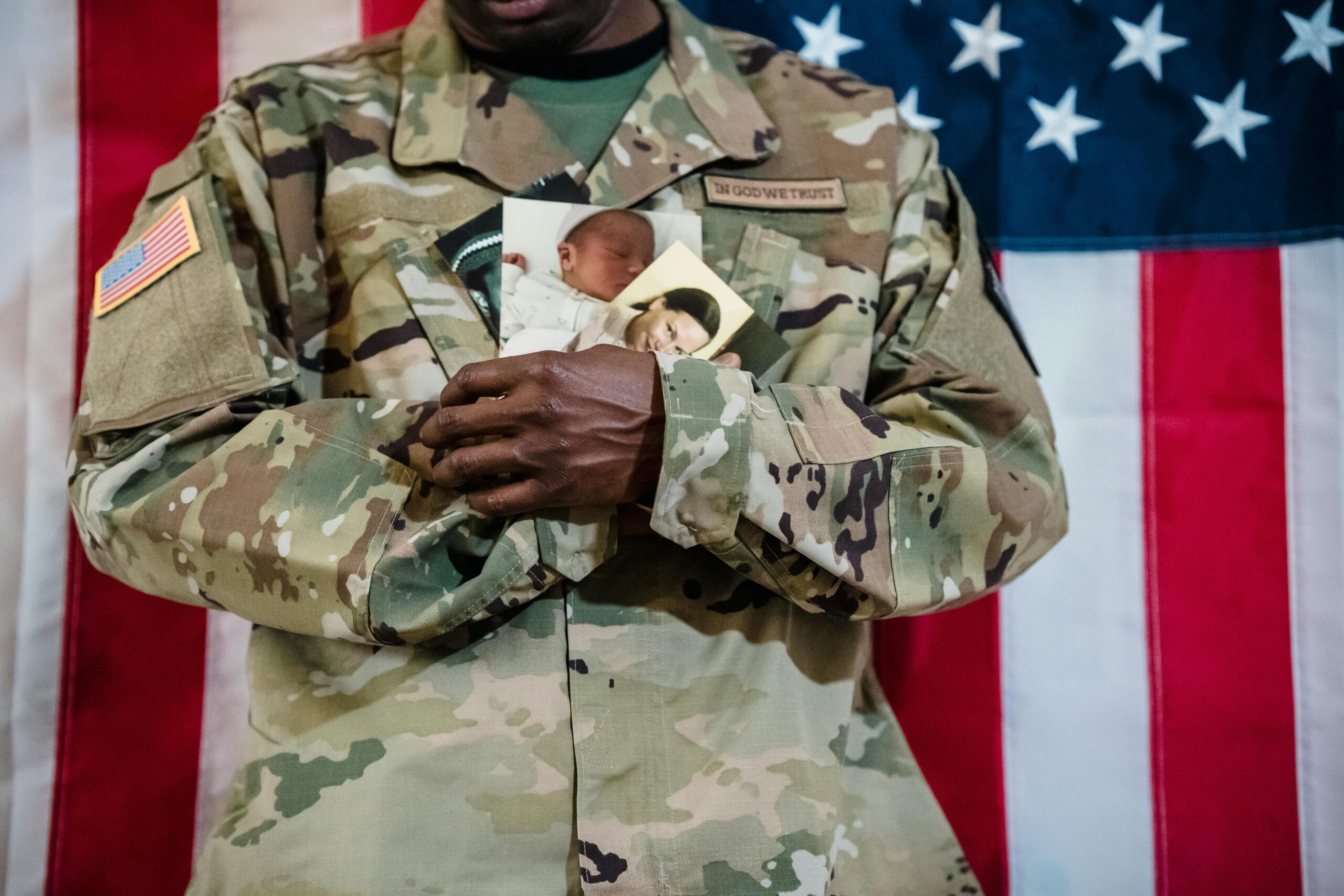
Updated January 7, 2026
Divorce is rarely simple, but for military families, deployment adds an extra layer of complexity to an already challenging process. Deployment creates unique legal, logistical, and emotional obstacles that can significantly impact everything from communication during the divorce to child custody and asset division. If you’re navigating a military divorce in Tampa and one party is deployed, understanding how deployment affects the divorce process is essential.
This guide explores the specific challenges of deployment in military divorces, the protections offered by federal laws, and practical solutions for service members and their spouses to ensure a fair and efficient process.
How Deployment Affects Divorce in Tampa
Military deployment complicates divorce in several key areas, including jurisdiction, the timeline of proceedings, and the ability of both parties to participate fully. Below are the primary ways deployment impacts divorce cases.
1. Delayed Divorce Proceedings
The Servicemembers Civil Relief Act (SCRA) provides active-duty service members with legal protections during civil proceedings, including divorce. This federal law allows service members to request a delay in divorce proceedings if their military duties prevent them from participating.
- Automatic Stay of Proceedings
Under the SCRA, a court can grant an initial 90-day stay of proceedings upon request. Additional extensions may be granted if the service member can demonstrate that their military duties continue to interfere with their ability to participate. - Balancing Rights and Delays
While the SCRA protects service members from being disadvantaged, it can also create frustration for the non-military spouse, who may feel the process is unnecessarily prolonged. Courts strive to balance these interests.
2. Jurisdictional Challenges
Determining where to file for divorce is often complicated for military families. Deployment can further complicate jurisdictional questions.
- Residency Requirements in Florida
To file for divorce in Florida, at least one party must have been a resident of the state for at least six months. For service members stationed outside of Florida or deployed abroad, establishing residency may depend on their Home of Record or domicile rather than their current location. - Filing While Deployed
A service member who is deployed can still initiate divorce proceedings in Florida with the help of a Tampa military divorce lawyer. However, their ability to actively participate in the case may be limited by their location and duties.
3. Child Custody and Deployment
One of the most challenging aspects of military divorce is determining child custody arrangements when one parent is deployed. Florida courts prioritize the best interests of the child, but deployment introduces unique concerns.
- Parenting Plans and Deployment Clauses
Florida law encourages parents to create detailed parenting plans that account for military obligations. These plans often include provisions for:- Temporary Custody Transfers: Assigning custody to the non-deployed parent or another guardian during deployment.
- Virtual Visitation: Using video calls and other technology to maintain a connection between the deployed parent and the child.
- Post-Deployment Adjustments: Reassessing custody arrangements once the deployed parent returns.
- Stability for Children
Courts aim to provide stability for children during a parent’s deployment, which often means awarding temporary sole custody to the non-deployed parent. However, this does not diminish the deployed parent’s rights or long-term custody arrangement.
4. Communication Challenges
Effective communication is critical in any divorce, but deployment can make this difficult. Time zone differences, limited access to technology, and the demands of military duties can create barriers to communication.
- Legal Representation
A Tampa military divorce lawyer can serve as an intermediary, ensuring that the deployed service member’s interests are represented even when direct communication is limited. - Technology Solutions
Virtual communication tools, such as email, video calls, and secure messaging platforms, can help bridge the communication gap.
5. Division of Assets and Deployment
Asset division is another area where deployment can create complications. Military benefits, including pensions, housing allowances, and other compensation, are subject to division under Florida’s equitable distribution laws.
- Accessing Financial Records
Deployment can make it more challenging for service members to access the financial documents needed for divorce proceedings. Spouses and their legal teams must coordinate to ensure accurate documentation. - Military Pension Division
The division of military pensions is governed by the Uniformed Services Former Spouses’ Protection Act (USFSPA). Deployment does not change the marital portion of the pension but may delay discussions about how it is divided.
Legal Protections for Deployed Service Members
The SCRA and other federal laws provide protections to deployed service members to ensure they are not unfairly disadvantaged in divorce proceedings.
The Servicemembers Civil Relief Act (SCRA)
The SCRA is a critical safeguard for deployed service members involved in legal matters. Key protections include:
- Delay of Proceedings
Service members can request a stay of divorce proceedings if their military duties prevent them from appearing in court. - Default Judgments
Courts cannot issue default judgments against a service member without appointing legal representation to protect their interests. - Termination of Leases
The SCRA allows service members to terminate residential leases early if deployment requires relocation, which can impact the division of marital property.
Military Power of Attorney
Deployed service members can designate a power of attorney to act on their behalf during divorce proceedings. This ensures that important decisions can be made even if the service member is unable to participate directly.
How Tampa Courts Address Deployment in Military Divorces
Tampa courts are experienced in handling the unique challenges of military divorce and deployment. Here’s how they approach key issues:
- Temporary Orders
Courts may issue temporary orders for custody, support, and property division to address immediate concerns while the service member is deployed. - Flexible Parenting Plans
Courts encourage parenting plans that accommodate the service member’s deployment schedule and maintain the child’s relationship with both parents. - Mediation and Collaboration
Tampa courts often recommend mediation to help military families resolve disputes amicably, reducing the emotional toll and time required to finalize the divorce. - Post-Deployment Adjustments
Upon the service member’s return, courts may revisit custody and visitation arrangements to ensure they reflect the current circumstances.
Tips for Managing Deployment During a Military Divorce
- Hire an Experienced Tampa Military Divorce Lawyer
Legal expertise is essential for navigating the complexities of deployment and military divorce. An experienced lawyer can ensure your rights are protected and help streamline the process. - Prepare Documentation Early
Deployment can make it harder to gather necessary documents, such as financial records and military service statements. Begin collecting these materials as soon as possible. - Communicate Clearly and Often
Use technology to maintain communication during deployment. Clear communication reduces misunderstandings and facilitates smoother negotiations. - Focus on the Children
If children are involved, prioritize their well-being by creating a stable and flexible parenting plan that accommodates military obligations. - Plan for Post-Deployment Adjustments
Be prepared to revisit and adjust agreements after the service member returns. Deployment is a temporary situation, and long-term arrangements should reflect post-deployment realities.
The Role of a Tampa Military Divorce Lawyer
Navigating a military divorce during deployment requires specialized legal knowledge. A Tampa military divorce lawyer can:
- Help service members file for divorce or respond to a petition while deployed.
- Draft parenting plans that account for military obligations.
- Ensure compliance with the SCRA and other legal protections.
- Negotiate fair asset division, including military pensions and benefits.
- Represent the interests of the deployed service member or their spouse in court.
“Having worked with many families stationed at MacDill Air Force Base, we know that deployment doesn’t just pause a case—it changes the communication strategy entirely. In our experience, waiting until a service member returns to begin discovery is often a mistake. We’ve found that by utilizing secure military communication channels and working with JAG offices early on, we can often facilitate a ‘partial settlement’ on property issues while the service member is still overseas. This proactive approach prevents the ‘legal backlog’ that many families face once the deployment concludes.
Florida’s residency laws for military personnel were designed to protect those serving abroad, but they require strict evidentiary support. To ensure our clients’ filings are ironclad for 2026 standards, we verify ‘intent to remain’ through documents like Florida voter registration and vehicle titles. Because a jurisdictional error can result in a case being dismissed months into the process, we recommend a formal review of your Home of Record status before filing to ensure the Tampa courts have the legal authority to preside over your dissolution.
Conclusion: Navigating Deployment in Military Divorce
Deployment is a significant challenge in military divorces, but with the right planning and legal support, both parties can work toward a fair resolution. Understanding how deployment affects jurisdiction, custody, asset division, and communication is essential for service members and their spouses navigating a Tampa military divorce.
If you or your spouse are facing a military divorce during deployment, consult a knowledgeable Tampa military divorce lawyer. With experienced legal guidance, you can protect your rights and achieve a smoother, more equitable outcome—even in the face of deployment’s unique challenges.
At The McKinney Law Group, we specialize in providing expert legal services in family law, estate planning, and divorce across Florida and North Carolina. Whether you need assistance with a prenuptial agreement in Tampa Bay or estate planning guidance in Asheville, our experienced team is dedicated to delivering personalized legal solutions tailored to your specific needs.
Legal issues can be complex and stressful, which is why we take a client-centered approach. We work closely with you to develop customized strategies that align with your goals, providing clarity and peace of mind throughout the process. With offices in both Florida and North Carolina, we make professional legal support easy and accessible, wherever you are.
If you need help with prenuptial agreements, estate planning, high-asset divorces, or other family law matters, contact Damien McKinney at 813-428-3400 or email [email protected] to schedule a consultation.
For added flexibility, we also offer online prenuptial agreement services, so you can manage your legal needs from the comfort of your home. Reach out today to learn more about how our efficient, client-focused approach can guide you through your legal journey with confidence.
Written by Damien McKinney, Founding Partner

Damien McKinney is the Founding Partner of The McKinney Law Group, bringing nearly two decades of experience to complex marital and family law matters. He is licensed in both Florida and North Carolina and has been repeatedly recognized as a Rising Star by Super Lawyers.
